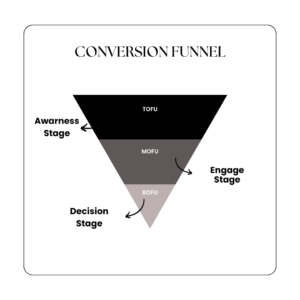If you’re looking to effectively market your online course, understanding the TOFU, MOFU, and BOFU framework can make a big difference. These terms refer to different stages in the marketing funnel, each requiring tailored strategies to move potential students closer to enrolling in your course.
Let’s understand what TOFU, MOFU, and BOFU are, why they matter, and the types of content that work best at each stage.
What Is TOFU, MOFU, and BOFU?
” TOFU stands for “Top of Funnel,
” MOFU for “Middle of Funnel,”
” BOFU for “Bottom of Funnel.”
Each stage represents a different phase in your potential students’ journey from discovering your course to becoming paying customers.

TOFU (Top of Funnel): This is the Awareness stage, This is where potential students first become aware of your course. At this stage your goal is to attract them by providing educational and Informative content addressing their needs and interests.
MOFU (Middle of Funnel): Here, you focus on nurturing the leads you’ve attracted. These individuals are interested but not yet ready to commit. At this stage help them see if your course is right for them and meets their educational needs. The content should build trust and show the value of your course.
BOFU (Bottom of Funnel): At this stage, potential students are close to making a decision. Your task is to convince them that your course is the best choice and encourage them to enroll. BOFU content is designed to close the deal.
Why TOFU, MOFU, and BOFU Matter
TOFU, MOFU, and BOFU helps in Segmentation, Segmenting your audience is very important because each stages need different approaches. And by understanding these important marketing stages you can create targeted content and will maximize your conversion rates.
Till now you have understand what is Tofu, Mofu and Bofu & why it matters. Now let’s discuss the types of content suitable for each different stages.
Types of Content for Tofu: Awareness stage.
Blog Posts:
- Articles you can write articles about the basics of your course topic.
- Sharing industry news and trends.
- Offering tips and advice related to your course.
Guides & How-To Articles:
- A detailed guides that help solve common problems.
- You can create beginner-friendly content to introduce your topic.
Ebooks:
- Offer a free ebook that covers the basics of your course topic.
- Provide comprehensive resources to spark interest.
Webinars:
- Host free webinars to share key concepts or industry insights.
- Offer Q&A sessions to engage your audience.
Podcasts:
- Discuss industry trends, tips, and interview experts.
- Talk about the importance and applications of your course topic.
Checklists:
- Provide actionable checklists to help with initial steps in the course topic.
Example: If you are a fitness coach, you might publish a blog post about “5 Common Mistakes in Home Workouts,” offering useful tips while subtly hinting that your course provides more in-depth solutions.
Types of Content for Mofu: Nurturing and Educating.
Case Studies:
- Share success stories of past students.
- Detail how the course helped them achieve their goals.
Email Newsletters:
- Send regular updates with valuable content, tips, and news.
- Highlight student success stories and course benefits.
Course Webinars:
- Host live or recorded sessions showcasing your course content.
- Demonstrate what students will learn.
Comparison Guides:
- Compare your course with others and highlight your unique features.
- Show why your course is the best choice.
Free Samples or Trials:
- Offer a free module or lesson to give a taste of your course.
- Give sneak peeks into the course content.
FAQs:
- Answer common questions about your course in detail.
Students Testimonials:
- Share reviews and feedback from happy students.
Example: If you are offering personality development course, you might offer a free webinar on “How to Build Self-Confidence in 30 Days” and follow up with case studies of past students who achieved significant personal growth.
Types of Content for Bofu: Converting and Closing.
Coupons & Discounts:
- Provide special offers to encourage enrollment.
- Use early-bird discounts or limited-time promotions.
Success Stories:
- Share stories of students who achieved great results after completing the course.
Limited-Time Offers:
- Create urgency with limited-time promotions to encourage quick decisions.
Course Comparisons:
- Highlight your course’s advantages over others with objective comparisons.
Example: If you are a Health Coach and offering health related courses, you might offer a free sample workout video along with a limited-time discount for new enrollees. A well-crafted landing page with testimonials and a clear call-to-action can help convert interested prospects into students.
Conclusion
By understanding and applying the TOFU, MOFU and BOFU framework, you can create a more effective marketing strategy for your online course. Tailoring your content to each stage of the funnel ensures you address the specific needs and concerns of potential students, ultimately guiding them from awareness to enrollment.
Remember, the key is to provide value at every step, build trust, and make the decision to enroll as easy as possible.
